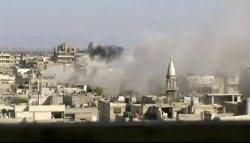Violence is continuing in Syria, with activists reporting government assaults on the southern city of Deraa and Homs in the center of the country.
Activists in Homs said several neighborhoods were under intense shelling for the third day in a row on Saturday. They said al-Khaldiyeh, Jouret al-Shayyah, al-Qusour and Old Homs were being bombarded with mortars and rockets.
At least six people were reportedly killed. Military reinforcements were reported to have arrived to the city, including armored vehicles and dozens of pickups equipped with machine guns.
Opposition strongholds in the city have been under shelling for many months, but activists said the intensity had increased significantly in recent days.
The nearby town of al-Qusayr was also said to have endured heavy shelling and a large number of buildings and agricultural areas were burning as a result.
Homs province has been the scene of large anti-government protests and has also become a stronghold for the armed opposition.
In the city of Deraa, where the uprising against Syrian President Bashar al-Assad's rule erupted 15 months ago, activists said 17 people, including 10 women, were killed overnight by shelling.
The UK-based Syrian Observatory for Human Rights, which monitors violence in Syria through a network of sources inside the country, reported fighting in the town between the army and opposition fighters after the shelling.
The Observatory said three soldiers died in clashes in the north of the country and four opposition fighters were also reported killed.
The UN says that well over 10,000 people have been killed since the uprising began in March 2011.
Situation 'more alarming'
In the latest diplomatic development, Sergei Lavrov, the Russian foreign minister, said his country would not approve the use of force against the Syrian government at the United Nations.
Lavrov said "the situation is becoming more alarming", but stressed that there was no alternative to a peace plan mediated by UN-Arab League envoy Kofi Annan to stop the violence.
He said Russia was calling for a working group to pressure all parties of the conflict to implement the plan, which calls for a Syrian-led political transition.
Russia, along with China, has vetoed two Security Council resolutions against Assad and has vowed to oppose any military intervention.
Meanwhile, in Turkey, the Syrian National Council (SNC), the main opposition bloc, elected Kurdish activist Abdulbaset Sieda as its new leader, replacing Burhan Ghalioun who resigned from his post amid accusations that he was monopolizing power and was out of touch with the opposition on the ground.
'Yet another academic'
Al Jazeera's Anita McNaught, reporting from Istanbul, said it was unlikely that people in Syria would feel that he represented them any better than Ghalioun.
"He's yet another of those exiled academics, a philosophy professor who lived outside the country for some 18 years, more than a decade in Sweden," she said.
"People inside Syria feel that they have had to suffer and pay with blood while the SNC has set in hotels, holding meeting after meeting which hasn't yielded anything significant to help people.
She said he would also face challenges in terms of internal politics within the council.
"The election of a Kurd, some critics say, will make it look like the SNC is more responsive to Syria's minorities. But they'll also tell you he's only there because he has the backing of the Islamist faction in the SNC which other critics of the council say is the one that actually wields the power and calls the shots behind the scenes."
PHOTO CAPTION
This image made from amateur video released by Shaam News Network and accessed Friday, June 8, 2012, purports to show explosions in the Khaldiyeh area of Homs, Syria.
Al-Jazeera


 Home
Home Discover Islam
Discover Islam Quran Recitations
Quran Recitations Lectures
Lectures
 Fatwa
Fatwa Articles
Articles Fiqh
Fiqh E-Books
E-Books Boys & Girls
Boys & Girls  Hajj Rulings
Hajj Rulings Hajj Fatwas
Hajj Fatwas














